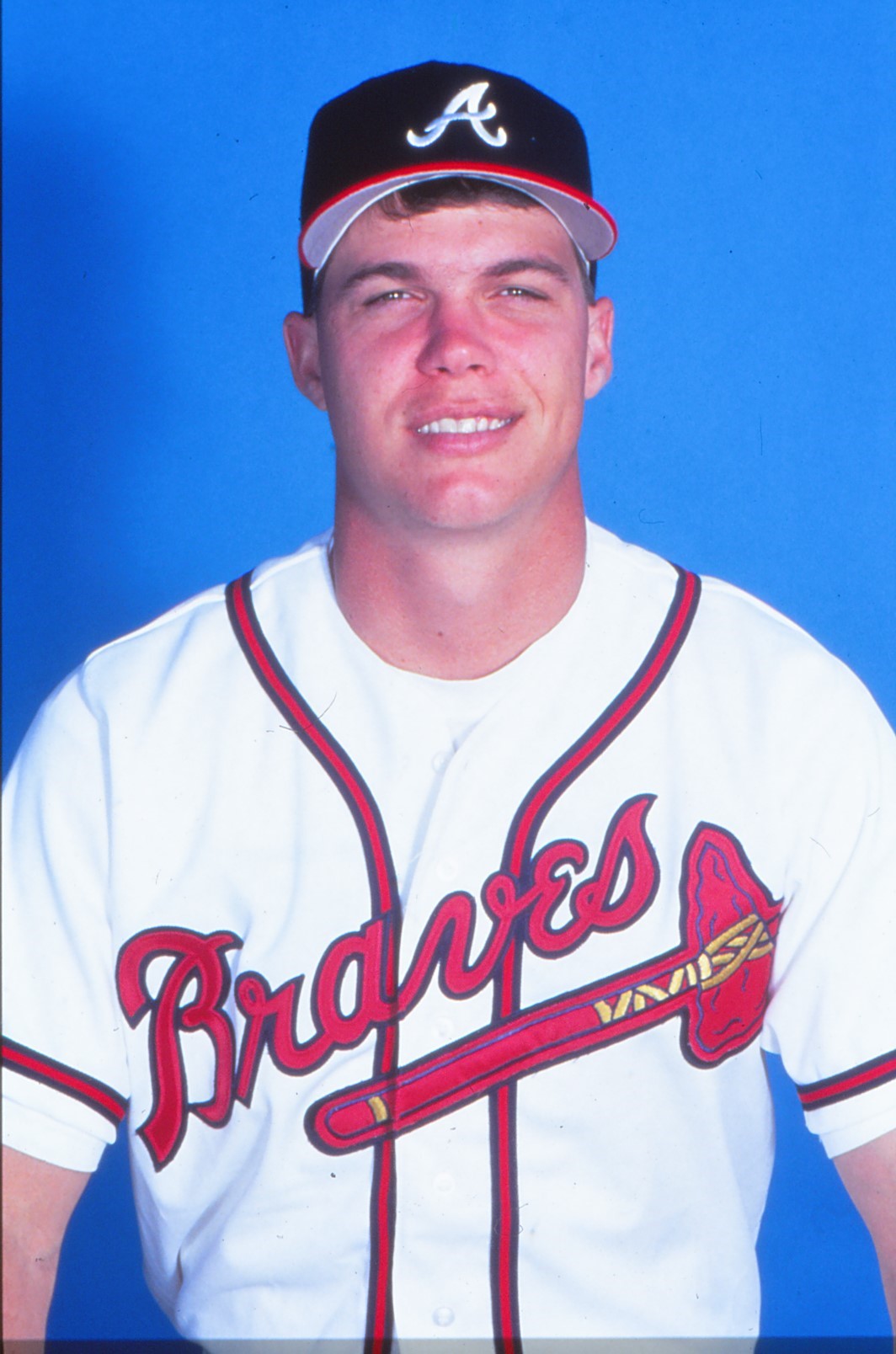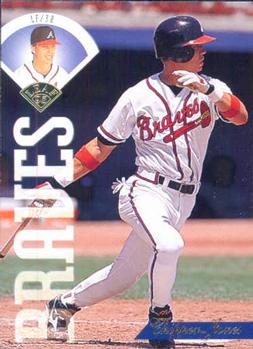May 9, 1995: Chipper Jones belts first career home run, a game-winner against the Mets
 The early-season Tuesday evening game was the first of a three-game series between the Atlanta Braves and the homestanding New York Mets.1 Tied for second with the Montreal Expos, the Braves were coming off a rare four-game sweep at the hands of the Philadelphia Phillies in Atlanta. They entered the Mets game with a record of 7-5, 1½ games behind the Phillies. The Mets had already suffered four agonizing walk-off defeats in the season’s first two weeks and were 4-7, four games off the pace.
The early-season Tuesday evening game was the first of a three-game series between the Atlanta Braves and the homestanding New York Mets.1 Tied for second with the Montreal Expos, the Braves were coming off a rare four-game sweep at the hands of the Philadelphia Phillies in Atlanta. They entered the Mets game with a record of 7-5, 1½ games behind the Phillies. The Mets had already suffered four agonizing walk-off defeats in the season’s first two weeks and were 4-7, four games off the pace.
The game drew an announced crowd of 14,882 to see an intriguing pitching matchup that pitted two of the National League’s more notable pitchers against each other. Neither pitcher had distinguished himself in his first two starts of the season.
Left-handed change-of-speed artist Steve Avery was the starter for the Braves. The two-time 18-game winner entered the game with a record of 0-1 and a 5.19 ERA. The Mets countered with two-time American League Cy Young Award winner Bret Saberhagen. The Mets right-hander also entered the game with a 0-1 record and an elevated 7.50 ERA.
The game-time temperature was a seasonably cool 62 degrees and conditions were dry when Saberhagen delivered the game’s first pitch at 7:35 P.M. Saberhagen and Avery traded 1-2-3 innings in the first before the Braves scored first in the top of the second. Dwight Smith drew a one-out walk off Saberhagen, the only walk he would yield in the game, before Charlie O’Brien lined a home run deep into the bleachers down the left-field line. After an inning and a half, the score stood at Braves 2, Mets 0.
For a while it seemed as though “the 25th career home run of eternally light-hitting former Met backup catcher O’Brien”2 might be the difference as the two starters engaged in a classic pitching duel. Avery kept the Mets off the board until the bottom of the sixth, when the home team scored a run. Saberhagen led off the inning with a double to left. Brett Butler laid down a sacrifice bunt to third, moving Saberhagen to third. Edgardo Alfonzo followed with a fly to deep right-center to score Saberhagen and make the score 2-1.
Greg McMichael replaced Avery in the bottom of the seventh. The move was part of a double switch that sent Mike Kelly into right. McMichael, who was the Braves’ closer a year earlier and was now a right-handed setup man, pitched a scoreless seventh.
Josias Manzanillo relieved Saberhagen in the top of the eighth. The right-hander from the Dominican Republic entered the game with a record of 0-0 and and 11.12 ERA. Manzanillo retired the Braves to keep the Mets within a run.
McMichael returned to the mound for a second inning in the bottom of the eighth. After retiring Brett Butler on a grounder to second and getting Alfonzo to fly out to right, McMichael appeared headed for an easy inning as Mets second baseman Jeff Kent came to the plate. Kent, who was mired in an early-season slump (.167 with one home run and three RBIs), deposited an 0-and-1 offering from McMichael into the left-field bullpen, tying tie the game.
Braves rookie left fielder Chipper Jones led off the top of the ninth. The switch-hitting Jones, who entered the game hitting .233, was playing because regular outfielders David Justice and Ryan Klesko were injured. With the count 2-and-0, Jones, who was batting left-handed, crushed a fastball into the right-field loge seats off Manzanillo.3 Jones’s first major-league home run gave the Braves a 3-2 lead and put McMichael in a position to earn the victory. After the game, Jones told reporters, “I can’t tell you the feeling I had when I was rounding first base. It is really a weight off my shoulders.”4
Right-handed rookie Brad Clontz, who had saved three of the Braves’ first seven victories but faltered in his previous outing, came on in the bottom of the ninth to preserve the victory for McMichael. Clontz hit leadoff batter Todd Hundley and Carl Everett sacrificed the Mets catcher to second. Clontz then retired Ricky Otero and David Segui on fly balls to end the game. Acknowledging his failure to hold a one-run lead two days earlier, Clontz said afterward, “I wanted to get back out there in a one-run game and finish it out.”5
McMichael earned the victory and moved his record to 2-0. Clontz earned his fourth and final save of the season. He blew a save opportunity in his next outing and relinquished the closer role to right-hander Mark Wohlers. Manzanillo, who less than a month later was claimed off waivers by the pitching-starved New York Yankees, suffered the loss for the Mets. The time of the game was 2:21.
The victory was the Braves’ sixth in seven on the road. Manager Bobby Cox put the victory in context after the game: “After losing four straight at home and coming in here to face one of the best pitchers of the last 15 years, I’d say that was a great win for the Braves.”6
Jones’s first major-league home run was a long time coming for the future Hall of Famer, who was ticketed for superstardom after being selected number one in the 1990 amateur draft out of the Bolles School in Jacksonville, Florida. He played in eight games with the Braves when the rosters expanded in September of 1993 and was slated to start the 1994 season as the team’s left fielder. This all changed on March 19, 1994, in an exhibition game against the Yankees at Fort Lauderdale, Florida. In the top of the fifth inning, Jones hit a groundball to shortstop, but the throw pulled Yankees first baseman Jim Leyritz off the bag. In an effort to avoid the tag, the rookie angled his body awkwardly and then crumpled to the ground.7 Jones missed the entire 1994 season.
Over the years, the Braves-Mets rivalry brought out the best in Jones. In 245 games against the Mets, he hit .309 with 49 home runs and 159 RBIs. As the rivalry heated up, New York fans increasingly focused their wrath on Jones, serenading the Braves star with chants of “Lar-ry, Lar-ry” — after pitcher Orel Hershiser mentioned in an interview that the Braves’ star hated being called by his given name.8
Jones finished the season with a batting average of .265 with 23 home runs and 86 RBIs, numbers that in many years would have earned him Rookie of the Year honors. However, in a controversial vote, Jones finished runner-up to Japanese phenom Hideo Nomo of the Los Angeles Dodgers. The 26-year-old Nomo had pitched for five years before coming to the Dodgers as a free agent and leading the National League in strikeouts in his first season.9
Jones went on to have a legendary career with the Atlanta Braves and finished his Hall of Fame career with a .303 average, 468 home runs, and 1,623 RBIs. Along the way he won the 1999 NL MVP Award, captured the 2008 NL batting title, and thrilled baseball fans everywhere.
Sources
In addition to the sources cited in the Notes, the author relied on Baseball-reference.com and Retrosheet.org.
Notes
1 The start of the 1995 season was delayed as a consequence of the 1994-95 players strike. The season did not open until April 26.
2 Howard Blatt, “Not Feeling Chipper: Jones’ HR in 9th Beats Josias,” New York Daily News, May 10, 1995: 52.
3 Blatt.
4 I.J. Rosenberg, “And Then Along Came Jones in the 9th,” Atlanta Constitution, May 10, 1995: 21.
5 Rosenberg.
6 Rosenberg.
7 William Juliano, “Remembering a Not So Chipper Start to Future Hall of Famer’s Career,” The Captains Blog, March 22, 2012. Retrieved from https://captainsblog.info/2012/03/22/remembering-a-not-so-chipper-start-to-future-hall-of-famers-career/13990/.
8 John Romano, “Braves-Mets: War of the Words,” Tampa Bay Times, October 12, 1999: 10C, as cited by Jacob Pomrenke in “Chipper Jones,” SABR BioProject. Retrieved from https://sabr.org/bioproj/person/b7c916e5.
9 Pomrenke.
Additional Stats
Atlanta Braves 3
New York Mets 2
Shea Stadium
Queens, NY
Box Score + PBP:
Corrections? Additions?
If you can help us improve this game story, contact us.


